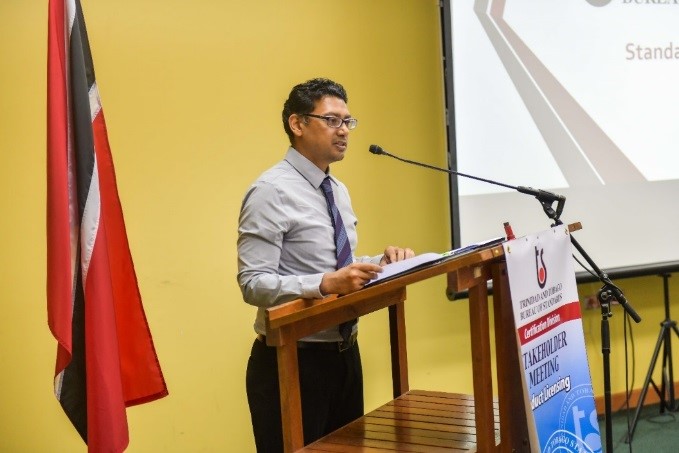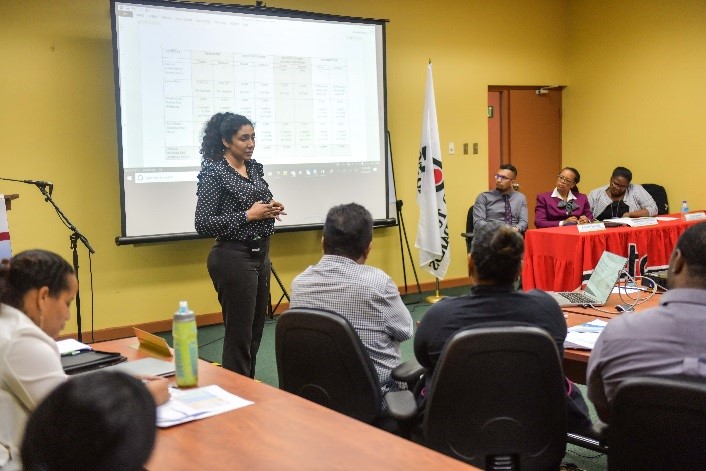“Where products and services pose a substantive risk to the consumer or public, Standards can be declared Compulsory, as is the case with the Standard for Liquid Chlorine Bleach being discussed today”.
Its use in eliminating dangerous micro-organisms and its hazardous nature demonstrates direct links to welfare, health and safety. It also demonstrates the need for standardization and enforcement of product quality. The product quality includes its efficacy, shelf life, labelling and consumer information related to the use, handling and dangers of the product”.
These were the words of Rodney Ramnath, Manager of the Certification Division of the Trinidad and Tobago Bureau of Standards (TTBS), as he addressed participants at the Opening Ceremony of the National Stakeholder Meeting on the Enforcement of the National Compulsory Standard – TTCS 1: 2018,Sodium Hypochlorite Solution (Liquid Chlorine Bleach) – Compulsory Requirements.
The meeting, which was held on Wednesday 31st July 2019 at TTBS in Macoya sought to enhance the participants’ understanding of the revised standard and to provide details of the updated enforcement programme. The standard applies to scented and unscented household liquid chlorine bleach used primarily for cleaning and sanitizing operations.
In attendance were representatives of various stakeholders from the Liquid Chlorine Bleach Industry. These stakeholders included Manufacturers, Importers, Distributors, Retailers, Governmental Organizations, Consumer Protection Agencies, and other interested parties. Amongst the participants were the Supermarket Association of Trinidad and Tobago, the Trinidad and Tobago Manufacturer’s Association, Regional Health Authorities and the National School Dietary Services Limited.
All Bleach used within Trinidad and Tobago is required to comply with the specifications set forth in the Standard. Bleach that does not meet these requirements will not be allowed on the market. Furthermore, compliance is now required to be demonstrated via licensing and certification of the product by TTBS. This will involve continual assessments of product quality via market surveillance and testing. A moratorium has been established by TTBS following which, full enforcement activities will begin. This moratorium began on 01st August 2019 and will conclude on the 30th September 2019.
The requirements include a minimum available chlorine content of 5% by weight between the ‘date of manufacture’ and the ‘best before date’; all of which are required to be stated on the product label.
Acknowledging TTBS as one of the agencies charged with a lead role in supporting national development, trade competitiveness and socio-economic growth, Mr. Ramnath further noted, “In order to more effectively fulfil its mandate, TTBS has developed a National Standardization Strategy. This strategy, which will be executed over the next few years, includes the review and development of standards related to:
- Quality, Health, Safety, the Environment and Energy Efficiency;
- Consumer Products;
- Tourism;
- Agriculture; as well as
- Electrical and Construction Products
… just to name a few”.
The Bureau’s activities which are mandated by the Standards Act (Act No.18 of 1997) play a pivotal role in ensuring the reliability and confidence of products and services which are offered, produced and used in Trinidad and Tobago.
TTBS is also assisting the Ministry of Trade and Industry (MTI) to institute the 2018-2030 National Quality Policy and Implementation Plan which was approved by the Government of the Republic of Trinidad and Tobago (GORTT) in April 2018.
Against this backdrop, TTBS contributes to overarching systems for consumer protection, industrial development, trade, the national quality infrastructure and a globally competitive Trinidad and Tobago.

IN THE SPOTLIGHT: Some of the promotional material used at the National Stakeholder Meeting on the Enforcement of the National Compulsory Standard TTCS 1:2018.

TALKING STANDARDS: Rodney Ramnath – Manager, Certification Division – TTBS, delivers opening remarks at the National Stakeholder Meeting.

THOROUGH EXPLANATION: Michelle Beharry, Standards Officer II – Certification Division, TTBS thoroughly takes participants through the Moratorium Process which began on 01st August 2019 and will conclude on the 30th September 2019.

